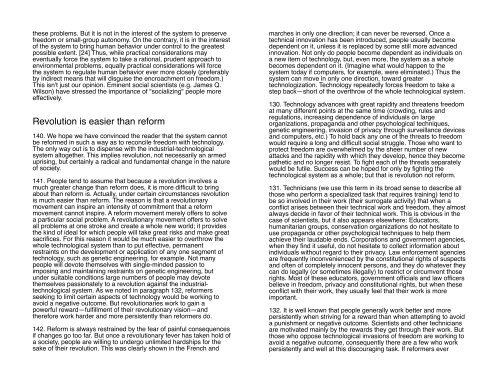Unabomber Manifesto - ouroboros ponderosa
Unabomber Manifesto - ouroboros ponderosa
Unabomber Manifesto - ouroboros ponderosa
You also want an ePaper? Increase the reach of your titles
YUMPU automatically turns print PDFs into web optimized ePapers that Google loves.
these problems. But it is not in the interest of the system to preservefreedom or small-group autonomy. On the contrary, it is in the interestof the system to bring human behavior under control to the greatestpossible extent. [24] Thus, while practical considerations mayeventually force the system to take a rational, prudent approach toenvironmental problems, equally practical considerations will forcethe system to regulate human behavior ever more closely (preferablyby indirect means that will disguise the encroachment on freedom.)This isn't just our opinion. Eminent social scientists (e.g. James Q.Wilson) have stressed the importance of "socializing" people moreeffectively.Revolution is easier than reform140. We hope we have convinced the reader that the system cannotbe reformed in such a way as to reconcile freedom with technology.The only way out is to dispense with the industrial-technologicalsystem altogether. This implies revolution, not necessarily an armeduprising, but certainly a radical and fundamental change in the natureof society.141. People tend to assume that because a revolution involves amuch greater change than reform does, it is more difficult to bringabout than reform is. Actually, under certain circumstances revolutionis much easier than reform. The reason is that a revolutionarymovement can inspire an intensity of commitment that a reformmovement cannot inspire. A reform movement merely offers to solvea particular social problem. A revolutionary movement offers to solveall problems at one stroke and create a whole new world; it providesthe kind of ideal for which people will take great risks and make greatsacrifices. For this reason it would be much easier to overthrow thewhole technological system than to put effective, permanentrestraints on the development or application of any one segment oftechnology, such as genetic engineering, for example. Not manypeople will devote themselves with single-minded passion toimposing and maintaining restraints on genetic engineering, butunder suitable conditions large numbers of people may devotethemselves passionately to a revolution against the industrialtechnologicalsystem. As we noted in paragraph 132, reformersseeking to limit certain aspects of technology would be working toavoid a negative outcome. But revolutionaries work to gain apowerful reward—fulfillment of their revolutionary vision—andtherefore work harder and more persistently than reformers do.142. Reform is always restrained by the fear of painful consequencesif changes go too far. But once a revolutionary fever has taken hold ofa society, people are willing to undergo unlimited hardships for thesake of their revolution. This was clearly shown in the French andmarches in only one direction; it can never be reversed. Once atechnical innovation has been introduced, people usually becomedependent on it, unless it is replaced by some still more advancedinnovation. Not only do people become dependent as individuals ona new item of technology, but, even more, the system as a wholebecomes dependent on it. (Imagine what would happen to thesystem today if computers, for example, were eliminated.) Thus thesystem can move in only one direction, toward greatertechnologization. Technology repeatedly forces freedom to take astep back—short of the overthrow of the whole technological system.130. Technology advances with great rapidity and threatens freedomat many different points at the same time (crowding, rules andregulations, increasing dependence of individuals on largeorganizations, propaganda and other psychological techniques,genetic engineering, invasion of privacy through surveillance devicesand computers, etc.) To hold back any one of the threats to freedomwould require a long and difficult social struggle. Those who want toprotect freedom are overwhelmed by the sheer number of newattacks and the rapidity with which they develop, hence they becomepathetic and no longer resist. To fight each of the threats separatelywould be futile. Success can be hoped for only by fighting thetechnological system as a whole; but that is revolution not reform.131. Technicians (we use this term in its broad sense to describe allthose who perform a specialized task that requires training) tend tobe so involved in their work (their surrogate activity) that when aconflict arises between their technical work and freedom, they almostalways decide in favor of their technical work. This is obvious in thecase of scientists, but it also appears elsewhere: Educators,humanitarian groups, conservation organizations do not hesitate touse propaganda or other psychological techniques to help themachieve their laudable ends. Corporations and government agencies,when they find it useful, do not hesitate to collect information aboutindividuals without regard to their privacy. Law enforcement agenciesare frequently inconvenienced by the constitutional rights of suspectsand often of completely innocent persons, and they do whatever theycan do legally (or sometimes illegally) to restrict or circumvent thoserights. Most of these educators, government officials and law officersbelieve in freedom, privacy and constitutional rights, but when theseconflict with their work, they usually feel that their work is moreimportant.132. It is well known that people generally work better and morepersistently when striving for a reward than when attempting to avoida punishment or negative outcome. Scientists and other techniciansare motivated mainly by the rewards they get through their work. Butthose who oppose technological invasions of freedom are working toavoid a negative outcome, consequently there are a few who workpersistently and well at this discouraging task. If reformers ever






